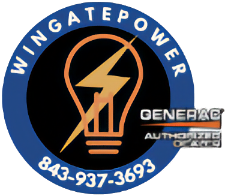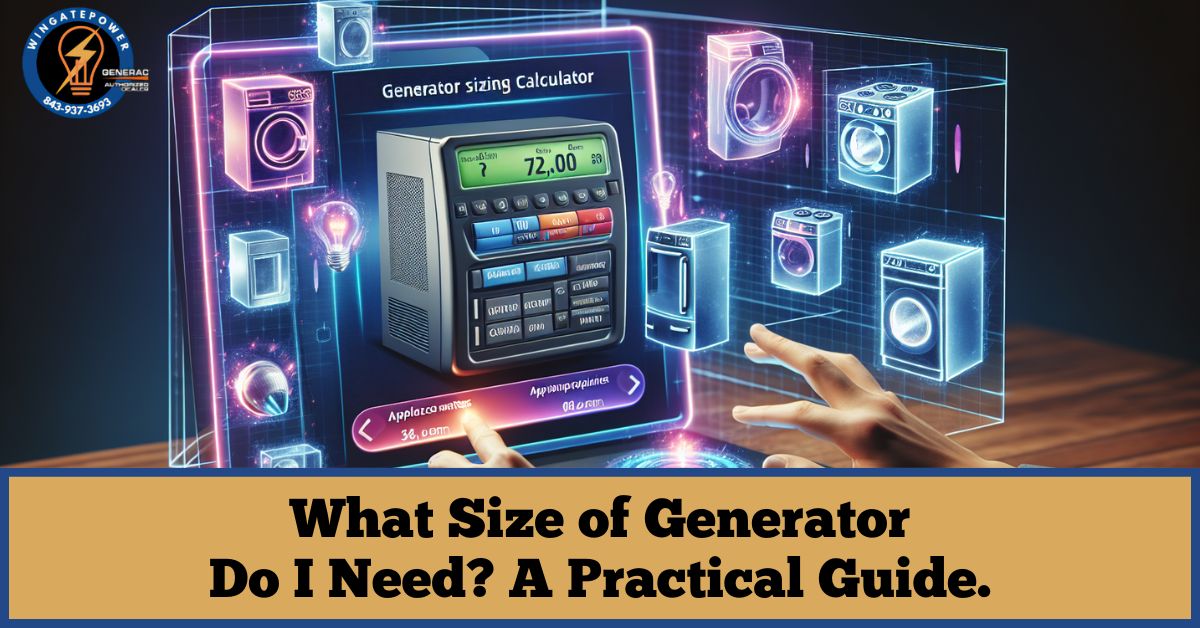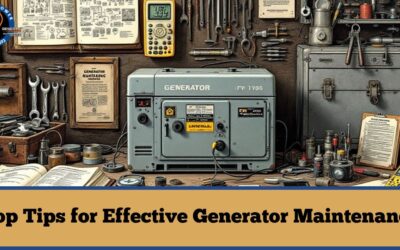Wondering “what size of generator do I need”? This guide will help you find the right generator for your home by assessing your power needs, understanding different generator types, and considering various factors that influence generator sizing.
TIP: If you’d like a short cut to finding the perfect generator for your home, request a FREE In-Home Consultation! During our visit, you’ll learn what size generator you need for your home, get all of your questions answered and get a 100% accuratly priced quote for your entire project! Click here to claim your Free Consultation.
Key Takeaways
- Identify essential appliances and compute total wattage requirements to determine the appropriate generator size. Appliances like refrigerators, sump pumps, and HVAC systems are critical during outages.
- Different types of generators have unique advantages: portable generators offer mobility, inverter generators are ideal for sensitive electronics, and standby generators provide automatic, continuous power.
- Consulting an electrician and considering factors like home size, fuel efficiency, and safety are crucial for selecting and installing the right generator. Regular maintenance and adherence to safety guidelines enhance efficiency and reliability.
Understanding Your Power Needs
The initial step towards selecting a suitable generator involves comprehending your power needs. During a power outage, continuity of operation for essential appliances and systems is paramount. Think about the items you can’t live without: refrigerators, air conditioning units, and sump pumps are often at the top of the list. Refrigeration, for instance, is vital for preserving food, water, and medicine.
But how do you determine how much power you need? Start by envisioning your home without electricity and consider what you’d miss the most. This perspective will guide you in identifying the essential appliances that must remain operational during a blackout. From there, you can estimate the total wattage required to supply power to these devices.
Essential Appliances
Standby generators are indispensable in maintaining the functionality of essential appliances during blackouts. For example, keeping your refrigerator running is critical to prevent food spoilage and preserve medication. To calculate the power usage of a refrigerator, check its annual kWh rating in the product specifications. Most new refrigerators are Energy Star-rated, making it easier to find their power consumption details.
It’s not just about refrigeration. Sump pumps and HVAC systems, including air conditioners, are also vital during power outages. Keeping your sump pump operational can prevent basement flooding, especially during heavy rains. Similarly, maintaining HVAC system functionality is essential to avoid poor air quality and mold growth, particularly in humid climates. A generator in the 10 to 15 kW range can cover these essential appliances along with:
- Microwaves
- Electric ovens
- TVs
- Water heaters
Considerations like climate can also impact your generator size. In areas with extreme temperatures, your HVAC system will need more power to maintain a comfortable indoor environment. Thus, it’s essential to factor in all these appliances when determining your power needs.
Estimating Total Wattage
Determining the correct generator size necessitates the computation of the total wattage of all vital circuits and devices. Start by adding up the wattage of each appliance. For instance, to calculate the power usage of a refrigerator, divide its annual energy use in kWh by 365, then by 24 to get the hourly wattage. Once you have the base number, add a 20% safety margin to ensure you don’t exceed the generator’s capacity, which helps accommodate unexpected surges or additional load.
If you’re unsure about how much power your home requires, consulting with an electrician can be beneficial. Electricians can accurately determine your home’s power needs by assessing the wattage requirements of all appliances and systems intended for backup. This step ensures that your generator will provide reliable power during an outage.
TIP: If you’d like a short cut to finding the perfect generator for your home, request a FREE In-Home Consultation! During our visit, you’ll learn what size generator you need for your home, get all of your questions answered and get a 100% accuratly priced quote for your entire project! Click here to claim your Free Consultation.
Types of Generators
A clear comprehension of the various types of generators assists in selecting the most suitable one for your needs. There are four main types of generators:
- Fossil fuel generators
- Inverter generators
- Solar generators
- Whole-home generators
Each type serves a different purpose and has its own set of advantages and disadvantages. Each type has its unique advantages and suitability for different scenarios.
Choosing the right generator involves considering factors such as portability, noise levels, and the specific power needs of your home or activities. Let’s explore the different types in more detail.
Portable Generators
Portable generators, characterized by high versatility, can supply power at home, during travel, and at work sites without significant fuel costs or noise production. A portable generator is particularly useful for contractors who need mobility and power tools at construction sites. Additionally, they’re perfect for recreational activities like camping trips, where they can power lights or small appliances.
Brands like Generac offer portable generators that are user-friendly and efficient, ensuring you have reliable power whenever and wherever you need it. Whether you’re dealing with frequent power outages or just need a backup for outdoor activities, portable generators are a practical choice.
Inverter Generators
Known for their stable power output, inverter generators are perfect for powering sensitive electronics. These generators are lightweight, portable, and quiet, making them perfect for activities like tailgating and RV camping.
Inverter generators, like the inverter generator, adjust their engine speed based on the power demand, resulting in higher fuel efficiency and lower noise levels. This feature makes them a popular choice for those who need a reliable and quiet power source without compromising on performance.
Standby Generators
Standby generators provide uninterrupted power without the need for manual intervention by automatically activating during a power outage. They are connected directly to your home’s electrical panel, ensuring a continuous power supply to the entire house. This automatic operation is similar to that of a home air conditioning unit, offering convenience and peace of mind.
Brands like Generac offer standby generators that include Mobile Link Remote Monitoring, allowing you to check the generator’s status from anywhere. Whether you’re home or away, a standby generator ensures that your entire home remains powered during outages.
Calculating Generator Size
To calculate the appropriate generator size, one must identify the wattage requirements of the appliances and comprehend the difference between running and starting watts. Locate the labels on your appliances that list the starting and running wattage. Using the formula Volts (V) x Amps (A) = Watts (W) can help convert these values.
Summing up the running watts of all appliances ensures you don’t exceed the generator’s capacity. Also, consider the appliance with the highest starting wattage and add it to the total running wattage to determine the generator’s required starting watts. This comprehensive approach ensures you select a properly sized generator.
TIP: If you’d like a short cut to finding the perfect generator for your home, request a FREE In-Home Consultation! During our visit, you’ll learn what size generator you need for your home, get all of your questions answered and get a 100% accuratly priced quote for your entire project! Click here to claim your Free Consultation.
Running Watts vs. Starting Watts
Comprehending the distinction between running watts and starting watts is vital for determining the generator size. Running watts, also known as rated watts, are the continuous power an appliance draws while operating. On the other hand, starting watts, also known as peak or surge wattage, is the extra power required to start an appliance.
When determining the appropriate generator size, consider both the running watts and starting watts of your appliances. This ensures that the generator can handle the overall electrical load, including any surges when appliances start up.
Using a Generator Sizing Calculator
Using an online generator sizing calculator can simplify the process of estimating the generator size needed for your home. These calculators help by adding up the wattage of household appliances and suggesting the appropriate generator size based on your inputs.
By inputting the wattage requirements of your appliances, these tools provide a quick and accurate estimate of the output power needed, converting the total wattage to kilowatts if necessary. This method is particularly useful for those unsure about their power needs and looking for a reliable way to determine the right generator size.
Special Considerations for Different Home Sizes
Selection of a generator necessitates considerations of your home size, total energy consumption, and potential future expansions. Larger homes generally require generators with higher wattage capacities to handle more appliances and systems simultaneously. Additionally, future home expansions or increased family size can raise the overall electrical demands, suggesting a need for a generator with additional capacity.
There are different options for generator coverage, including essential circuit coverage, managed whole house coverage, and complete whole house coverage. Understanding these options will help you make an informed decision based on your specific needs.
TIP: Download a copy of our FREE Generator Buyer’s Guide to help you find the perfect generator for your home. Click here to download “5 Things Every Generator Should Have”!
Small Homes and Apartments
For homes under 1,000 square feet, a generator size of 7.5 to 9 kW is generally sufficient. This size can cover typical appliances such as:
- refrigerators
- microwaves
- TVs
- computers
- small water heaters
Small homes and apartments can rely on these generators to provide essential power without overloading the system.
Medium-Sized Homes
Homes between 1,000 and 1,500 square feet typically require a generator in the range of 10 to 15 kW. When determining the suitable generator size for medium-sized homes, consider the square footage and the power needs of common household appliances, such as:
- Refrigerator
- Air conditioner
- Heater
- Washer and dryer
- Oven and stove
- Television
- Computers and laptops
- Lights
This ensures that your “generator do i need” can handle the demand without any issues, thanks to the appropriate size generator.
Large Homes
For homes sized at 3,000 to 4,000 square feet, a generator between 22 and 36 kW is suitable. These generators can handle multiple high-wattage appliances, including central air conditioning and electric dryers.
Large homes have higher power demands due to the presence of multiple high-wattage appliances and larger living spaces. Considering these factors ensures that your generator is capable of providing reliable power to your entire home, even during extended outages.
Fuel Types and Efficiency
The selection of suitable fuel for your generator influences its efficiency, reliability, and overall performance. Common generator fuels include:
- gasoline
- diesel
- natural gas
- propane
- biodiesel
The choice of fuel should consider factors like cost, availability, storage, emissions, and power output.
Natural gas generators, for example, are cost-effective, efficient to operate, and better for the environment compared to other fossil fuels. Let’s explore the different fuel options in more detail.
Natural Gas and Propane
Natural gas and propane generators are known for their reliable performance and low environmental impact. Some benefits of propane generators include:
- Clean-burning fuel
- Portability
- Reduced emissions
- Flexibility in fuel options, especially in dual-fuel generators
These generators offer long-term power without the need for frequent refueling, making them a popular choice for home use.
Gasoline and Diesel
Gasoline and diesel are common fuel choices for generators, each with its own set of advantages and disadvantages. Gasoline is suitable for short-term power needs but is less efficient for prolonged use due to its lower energy density. Additionally, gasoline has a limited shelf life and can be challenging to store safely in large quantities.
Diesel generators, on the other hand, are known for their efficiency and durability, making them ideal for commercial and industrial settings. Diesel fuel has a longer shelf life compared to gasoline, making it preferable for long-term storage. Moreover, diesel is less flammable than gasoline, which makes it a safer option for storage.
Solar-Powered Generators
Solar-powered generators are an environmentally-friendly and renewable energy option. These generators produce no emissions during operation, making them an eco-friendly choice for backup power. They harness energy from the sun, which is a clean and sustainable resource.
Solar generators are perfect for running smaller appliances like:
- lights
- power tools
- televisions
- laptops
They are also suitable for powering other electronics. While they may not be suitable for high-wattage appliances, they offer a green alternative for those looking to reduce their carbon footprint.
Safety and Maintenance Tips
Safe and efficient use of generators requires adherence to installation safety guidelines, regular maintenance, and precautions against carbon monoxide. These steps not only protect your investment but also ensure the generator operates efficiently when you need it most.
Installation Safety
It is essential to consult a licensed electrician for correct generator installation. Install a power transfer switch if you want to connect the generator to your home’s wiring, and have it done by an electrician. Qualified installers ensure the generator is grounded properly and complies with local regulations, which is essential for safety.
Never attempt to power house wiring by plugging the generator into a wall outlet, as this can lead to serious hazards. Operate the generator on a dry surface under an open canopy-like structure. Additionally, always turn off the generator and let it cool before refueling to prevent fire risks from gasoline spills.
Regular Maintenance
Regular maintenance is necessary to maintain your generator in optimal working condition. Diesel generators typically last longer and require less maintenance compared to natural gas generators. Check extension cords for cuts, tears, and the presence of all three prongs, especially the grounding pin.
WingatePower offers comprehensive maintenance plans to ensure your generator is always ready to provide backup power during emergencies. These plans are designed to:
- Protect your investment
- Save you from the hassle of performing maintenance tasks yourself
- Have expert technicians handle all aspects of generator upkeep, ensuring it operates efficiently and reliably.
Carbon Monoxide Precautions
Carbon monoxide, a silent killer, necessitates precautions to prevent its accumulation. Install carbon monoxide alarms in central locations on every level of your home and outside sleeping areas. Never use gasoline, propane, natural gas, or charcoal-burning devices inside your home, garage, or any partially enclosed area.
Avoid placing the generator in enclosed areas to prevent carbon monoxide build-up. Following these precautions can save lives and ensure your generator is used safely.
Professional Help and Installation
For safe and efficient operation of your generator, it is crucial to consult an electrician and employ professional installation services. Professionals ensure that your generator is installed correctly, complies with local regulations, and maintains its warranty.
Consulting an Electrician
Consulting an electrician is crucial for ensuring the backup generator is set up correctly and functions reliably when needed. Electricians ensure the backup generator is seamlessly integrated with the existing electrical system and adheres to local building codes and safety standards.
WingatePower offers:
- Free in-home consultations with no obligation
- Learn about your options and get accurate pricing for the entire generator project
- This consultation ensures you know the best options for a generator tailored to your needs.
Professional Installation Services
Standby generators require professional installation to ensure safe and effective operation. Professional services encompass:
- Site assessment
- Transfer switch installation
- Electrical connection
- Fuel source connection
These services ensure that your generator operates efficiently and complies with all safety standards.
The company provides pictures of their work around Charleston as evidence of their services. By choosing professional installation, you can have peace of mind knowing that your generator is set up correctly and that its warranty remains intact.
Summary
Choosing the right generator size involves understanding your power needs, exploring different types of generators, calculating the appropriate size, and considering special requirements based on your home’s size. Fuel types and efficiency, safety and maintenance tips, and professional installation are also crucial factors. By following this guide, you can ensure that your home remains powered during outages, providing peace of mind and convenience.
Frequently Asked Questions
How can I determine the generator size needed for my home?
To determine the generator size needed for your home, calculate the total wattage of essential appliances and add a 20% safety margin to ensure adequate power during an outage.
What are the different options for generator coverage for homes?
There are three main options for generator coverage for homes: essential circuit coverage, managed whole house coverage, and complete whole house coverage. Choose the one that best fits your needs.
Why is it important to consult an electrician for generator installation?
It’s important to consult an electrician for generator installation to ensure the correct setup, integration with your home’s electrical system, and compliance with local building codes and safety standards. This ensures the safety and efficiency of the generator.
What are the benefits of using natural gas or propane generators?
Using natural gas or propane generators can provide clean-burning, efficient, and reliable performance with low environmental impact, while propane offers the additional benefit of portability and reduced emissions.
What maintenance is required for generators?
Regular maintenance for generators includes checking extension cords, ensuring proper grounding, and scheduling routine upkeep. Consider choosing a comprehensive maintenance plan from a reputable provider for professional assistance with generator upkeep.




![[VIDEO] Why Now is the Best Time to Prepare for Storm Season with a Generator](https://www.wingatepower.com/wp-content/uploads/2025/01/Palmetto-Live-Jan-2025-Segment-WingatePower-Generac-Generators-400x250.jpg)

![[VIDEO] Beating a Charleston Power Outage: Protect Your Home with a Generator](https://www.wingatepower.com/wp-content/uploads/2024/10/Charleston-Power-Outage-Solution-Generators-400x250.jpg)